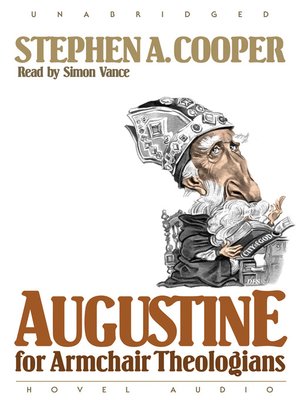I listened to the audiobook of Augustine for Armchair Theologians (Stephen A. Cooper, 2002) mainly out of curiosity for what the author would say to "armchair theologians," although as someone who has a master of divinity degree and teaches in a seminary, I probably don't exactly count as an armchair theologian. What I appreciated about this book is that it went through the entire book of his Confessions and pulled out important moments and key points, and placed them within their cultural milieu in a way that likely would make sense for the average college-educated reader. This is a very accessible text and gives a good overview of Augustine's life and struggles, and the reasons behind those struggles, which may not be entirely clear if one was reading through the Confessions unaided. It also includes a brief overview of City of God.
I realized that previously, though I read the Confessions and City of God years ago, I was mainly reading them for his theology, and to learn about church history in his lifetime, and not so much for learning about his life and personal experience. Yes, I assign chapters from his Confessions when I teach church history to undergrads, so I was very aware of his conversion experiences and other highlights, but I hadn't spent a lot of time learning more than the basics of his biography. I enjoyed hearing Coopers explanation of why Augustine thought and emphasized certain things, and I appreciated his emphasis on the strangeness of Augustine's coming to God through "pagan" books.
I didn't like some of the presumptions Cooper made about Augustine's correctness or incorrectness of theological insight. In many places in the book he presented information and left it up for the reader to decide what was right and true, but especially toward the end of the text, after Augustine's conversion, Cooper makes more values-based statements about the correctness of Augustine's theology. It would have been better had he said something like, "This disagrees with the later version of orthodoxy according to [some council or pope]," but instead he made blanket statements about whether it was right or wrong without a lot of context for what branch of Christianity his judgments flow from.
In the past, I admit, when I've read Augustine it has often been to disagree with him, since much of the Just War Theory is based on his writings. I enjoyed the chance to get to know the man behind the theology. It gives me a better basis for empathy for his belief system.
I recommend this book to those interested in learning more about Augustine, but if you haven't read the Confessions or City of God yourself, I encourage you to read those afterwards, too.

I've read his Confessions, other writings by him, and one scholarly biography.
ReplyDelete:-( Augustine is the one who emphasized the horrific concept that God only loves to save a limited number of humans. He also wrote that unbaptized infants couldn't go to Heaven:-(
Furthermore, he used the government to persecute others.
Very bad news.
Definitely some bad news. Or maybe a lot of bad news. But he's also a really fascinating person, and his life provides an interesting snapshot into church history. I don't like all of his theology (or...much of it), but it is thought-provoking and makes more sense within his context.
ReplyDelete